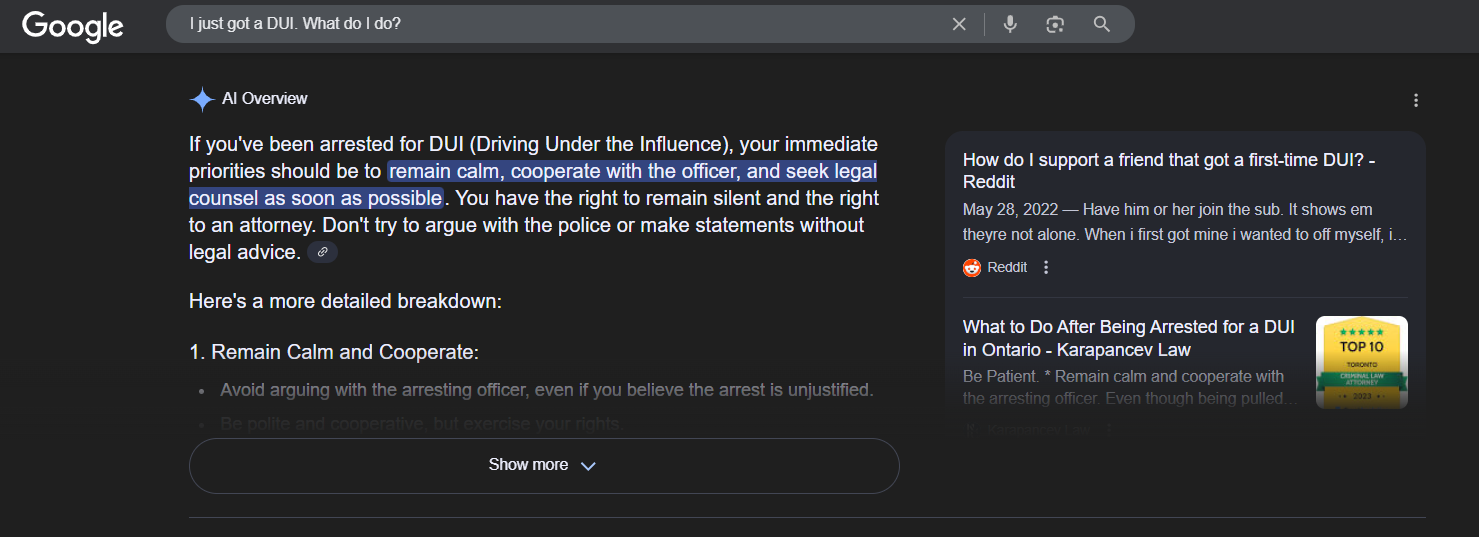
Your top-performing legal content isn’t getting the clicks it used to. Google’s new AI Overviews are answering legal questions directly in search results. As a result, your firm’s listings are often pushed below the fold. That means fewer visitors, fewer leads, and more uncertainty about what SEO even means anymore.
You’re not doing anything wrong. But the game has changed. If your content isn’t showing up in AI search, it’s getting left behind.
In this article, you’ll learn how AI Overviews work, why they’re disrupting law firm SEO, and what you can do right now to stay visible and competitive in 2025.
Google’s AI Overviews, previously called Search Generative Experience (SGE), now appear at the top of search results. Instead of showing a list of links, Google uses its Gemini AI model to pull content from multiple sources and generate a direct answer to the user’s question.
For legal searches, this means Google often shows a summary before any law firm website, even before the user clicks anything.
These summaries are designed to help users “get up to speed quickly.” They usually include a short explanation, source links, and follow-up questions.
For example, if someone searches, “I just got a DUI. What do I do?”, Google provides a legal summary with key steps and context. In many cases, the user never sees your site on the first screen.

Google hasn’t shared exactly how it selects sources, but early studies show it favors pages with clear structure, strong E-E-A-T signals, and direct, helpful content. AI Overviews are already live across most U.S. searches and will only become more common.
For law firms, this is a major shift in how potential clients discover and trust legal information online.
You haven’t lost rankings. You’ve lost clicks. Google’s AI Overviews and the rise of zero-click search are pulling users away from your site. In many cases, they don’t even reach your listing.
According to SparkToro, nearly 60% of U.S. searches now end without a click. This trend is especially strong on mobile.
Desktop results are quickly following the same pattern. Users are getting the answers they need directly on the results page, so they’re not scrolling to find your content.
The biggest impact hits high-volume legal queries. These include definitions, step-by-step processes, and “what to do if…” scenarios. These are the exact types of questions that AI Overviews are designed to answer. Your page might technically rank, but if it isn’t featured in the AI response, most people will never see it.
Not all searches are affected equally. Branded queries, local intent, and niche legal topics still drive traffic. But those opportunities are shrinking.
The real risk isn’t dropping a few positions in the rankings. It’s being excluded from the answer entirely.
To win in the age of AI Overviews, you need to adapt, not panic. Here’s how:
Write in short, question and answer blocks, like FAQs and step by step guides.
Google’s AI pulls chunks of content, often called fraggles, from pages. If your site answers questions in clear, focused passages, it increases the chances your content will power the AI.

Your content needs to speak plainly. Cover specific queries like “What documents do I need to file for divorce in Texas?” State the answer first, fill in details second.
Employ schema markup (e.g., FAQPage, HowTo) and clear formatting with headings. These cues help Google parse your content and understand its relevance.
AI Overviews favor clear, concise answers that don’t confuse the reader. Strip out legal jargon unless necessary, then explain it simply.
Show attorney bylines, bios, credentials, and real-world experience. Cite trusted sources. AI’s source model looks for signs of authority and trust.
Platforms like Semrush now offer AI Overview tracking. You need to know whether your content is being cited or overlooked.
If you want your content to appear in AI Overviews, strong writing isn’t enough. You need clear trust signals that show your authority to both users, Google, and even ChatGPT.
Google’s AI relies on E-E-A-T: Experience, Expertise, Authoritativeness, and Trustworthiness. These are the signals it uses to determine which content it includes. If your content doesn’t demonstrate these traits, it likely won’t be selected.
Here is how to position your firm as a source Google can trust:
SEO in 2025 is no longer just about keywords. It’s about credibility and clarity presented in a way machines can understand.

“My website continues to dominate all the top website searches in my industry and my business has grown 10-fold as a result.”
Oykhman Criminal Defence
AI Overviews are already reshaping how clients find legal help online. Traditional SEO is no longer enough. If your firm is not part of the AI summary, you risk becoming invisible. That’s true even if your content still technically ranks.
This shift is not a dead end. It’s a turning point. Law firms that adapt can gain a new competitive edge. When you optimize for clarity, authority, and structure, you increase your chances of being featured in the very system that’s changing search.
Now is the time to take action. Audit your content, rethink your strategy, and make sure your firm is positioned to lead in AI-powered search. If you want help making that shift, I’m ready to guide your firm through it.
Ready to maximize your marketing budget? Fill out the contact form or call us today for a complimentary consultation. We will listen to your story, work to define your business objectives, and recommend an approach to deliver maximum ROI for your firm.
By using this website, you consent to our use of cookies in accordance with our Cookie Policy. Cookies help us enhance your browsing experience and provide personalized content. If you do not agree to our use of cookies, please adjust your browser settings accordingly.